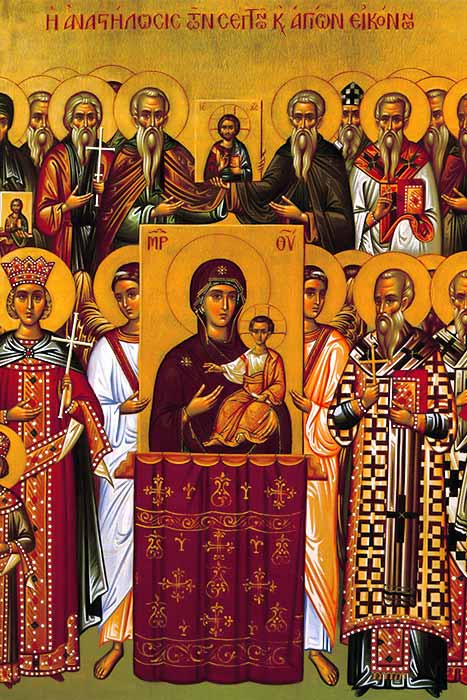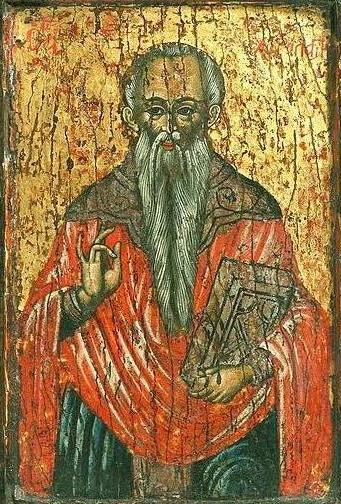For once you were darkness, but now you are light in the Lord; walk as children of light (for the fruit of light is found in all that is good and right and true), and try to learn what is pleasing to the Lord. Take no part in the unfruitful works of darkness, but instead expose them. For it is a shame even to speak of the things that they do in secret; but when anything is exposed by the light it becomes visible, for anything that becomes visible is light. Therefore it is said, “Awake, O sleeper, and arise from the dead, and Christ shall give you light.” Look carefully then how you walk, not as unwise men but as wise, making the most of the time, because the days are evil. Therefore do not be foolish, but understand what the will of the Lord is. And do not get drunk with wine, for that is debauchery; but be filled with the Spirit, addressing one another in psalms and hymns and spiritual songs, singing and making melody to the Lord with all your heart.
Ephesians 5:8-19 (Epistle of Feast of St. Nektarios)
When we think of the saints, often times we think of the early centuries of Christianity. We think of saints who lived in deserts, who had no modern conveniences. Saint Nektarios, who the church commemorates each year on November 9, is a “modern day” saint. He lived in the late 19th and early 20th centuries. He died just over 100 years ago and he was made a saint in 1961, before some of us were even born. Saint Nektarios was a bishop. He was a very prayerful man. He was ordained a priest in Egypt and was serving as a parish priest in Cairo. He was ordained a bishop in 1889. However, after serving for only one year, he was exiled from Egypt without any explanation. He spend his life writing, hearing confessions, preaching and celebrating the Liturgy. He died of cancer in 1920.
When he died, and people came to prepare his body for burial, they threw his clothes onto the bed next to him. And the man who was suffering from cancer on the bed was healed. After St. Nektarios was buried on the island of Aegina, his tomb began to emit oil and people who were anointed with the oil were healed. He was “proclaimed” a saint in 1961, after a groundswell of support from pious people who had been healed at his tomb. St. Nektarios is the patron saint of cancer patients.
The words I want to focus on today are from the Epistle lesson read on this day, from Ephesians 5:8-19. In verses 8:10, we read: “For once you were darkness, but now you are light in the Lord; walk as children of light (for the fruit of light is found in all that is good and right and true), and try to learn what is pleasing to the Lord.” In this passage, St. Paul reminds us that we once walked in darkness but now we are supposed to walk in the light of the Lord.
Saint Nektarios did not die a violent death. He did, however, have a challenging life. He was exiled without explanation. He had to leave his home for no reason. He lost his reputation without recourse. And yet he found a way to glorify God, and to witness for Christ. He actually intended to live his life in relative obscurity. He was content to be a priest, a man of prayer, a humble spiritual father, and a writer. He didn’t set out to achieve acclaim. But his quiet labor for Christ got him exactly that. He gained fame because of his humility. People flocked to him because of his piety. People asked his advice because he was living in Christ and Christ was living in him and this was very attractive to people stressed out by the challenges of life.
I love the story of St. Nektarios because it is a story that can belong to ANY of us. If we work with humility, if we seek to honor Christ in our lives, and if we strive to imitate the love of Christ, this will do two things for us. It will bring people to us because people want to be around loving and Godly people. And secondly, it will please God.
The word for “saint” in Greek is “agios.” And “agios” means set apart. Some of the “agious” (people who are set apart) are acclaimed as saints by us, and they are honored with churches and icons. The most important thing in life, however, is not to have a church named after you, or to be assigned a saint’s day. The most important thing in life is to be recognized by God as an “agios”, as one who tries to set his or her life apart from the ways of the world in order to embrace the ways of God. In so doing, God will recognize us as “agious” and save for us a place in His heavenly kingdom.
Saints are not just people who lived a long time ago. There are saints walking in our world today. There are people who when they die will be recognized as saints. The story of St. Nektarios proves that this could happen to any of us, if we live our lives as witnesses and imitators of Christ.
The son of Silybria, the guardian of Aegina, and the ardent lover of virtue who in recent years has appeared, the God-inspired servant of Christ Nektarios, O faithful, let us praise. For he gushes forth healings of every kind to those who cry out reverently: Glory to Christ who glorified you; glory to Him for your miracles; glory to Him who through you effects cures for all. (Apolytkion of St. Nektarios, Trans. By Fr. Seraphim Dedes)
Set yourself apart for Christ today!

